War Hospital review: Humanity is lost all too quickly

The casualty clearing station is overflowing with wounded, dead bodies block the surgery ward where exhausted doctors are waiting for the next patient, and the medic teams assigned to the cemetery are nearing collapse from burying the dead. Medicinal supplies are all but gone, HQ is up my butt because I didn’t give a general’s son preferred treatment, punishing me by taking a share of my valuable supplies, and the staff’s morale has hit rock bottom. Oh, and the trenches in the north of the hospital are basically empty, which means that the impending German attack will overrun us. This is what a doomed run in War Hospital looks like.
Developed by Brave Lamb Studios and published by Nacon, War Hospital puts you in charge of a British field hospital during World War 1. Starved for manpower, supplies, and eventually even the will to go on, you need to do what you can to save as many lives as possible.
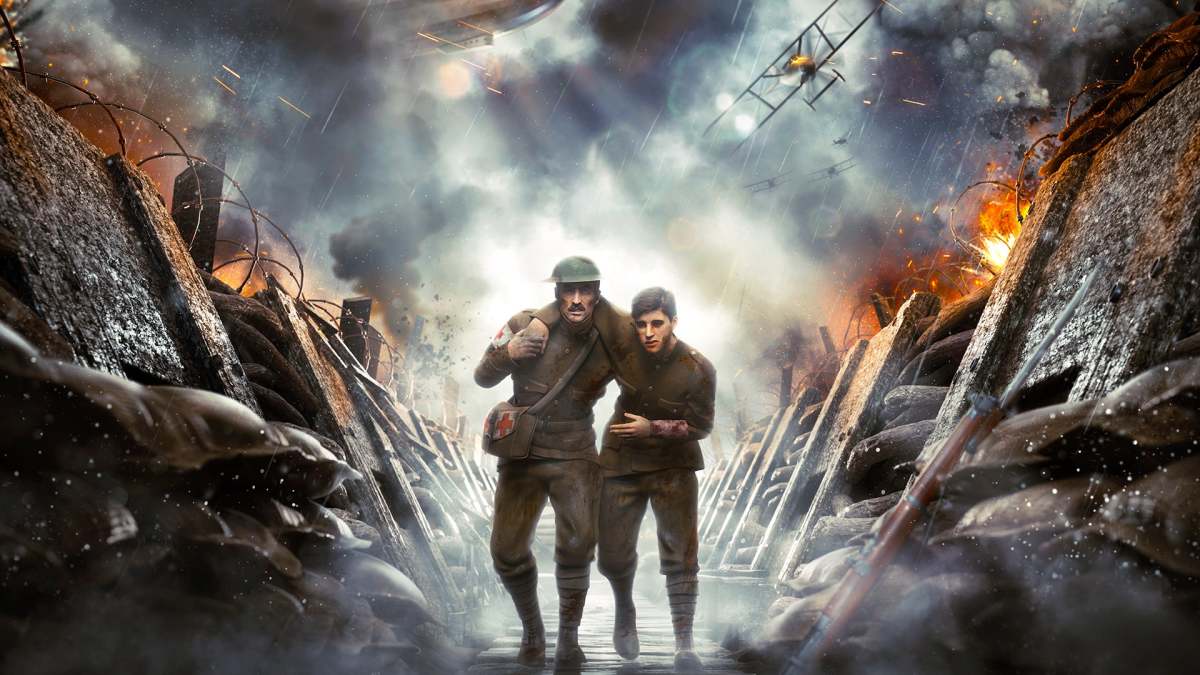
Resource management is kept relatively simple in this game: You need to keep an eye on food consumption, which rises the more staff members, patients, and other dependents you have at your hospital. You can add alcohol to the rations to make people a bit more content as well, so that’s the second resource. There are three medicinal resources as well, which are used to treat the three different types of patients present in the game: regular wounded, those wounded by a chemical attack, and those with mental trauma.
Most of these resources will come from local production, which you can upgrade over time, but they can also be ordered via train or picked up by scouts sent out into the surrounding area. You won’t be able to help anyone if your staff is starving or doesn’t have access to medicine, so this is of prime importance.
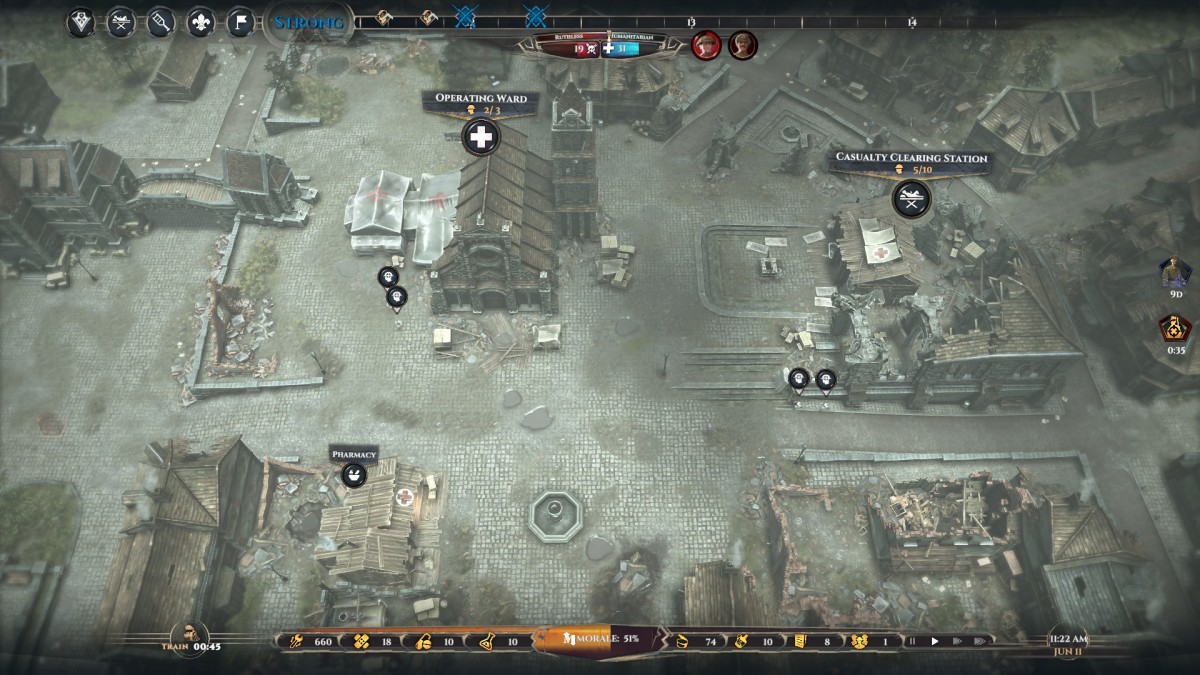
Your hospital staff consists of different unit types: Surgeons obviously operate on patients and nurses assist them in the operating ward in addition to keeping people alive in the CCS while they await being operated on. They also care for those recovering from successful operations. Medic teams do the hard work of transporting patients – dead or alive – between facilities. They are the logistical lifeblood of your hospital and it comes to a standstill should they collapse. There are also engineers, who construct buildings and improvements on top of making the medicines you need. Finally, scouts can explore the surrounding area, bringing back valuable resources to complement your storage.
As alluded to above, these units can all get exhausted and – in the most extreme cases – even collapse. This means that letting them rest from time to time is paramount to success, even if this means that patients may have to wait longer for operations. Yes, some even may die as a result, but it’s a necessary evil to ensure that more can be saved later. War Hospital is full of these gut-wrenching decisions. Like a real doctor, you’re constantly performing triage. One time my scouts came upon a burned farm, the property of a father of four children, whose wife died a while ago. He asked me to take care of the kids, but I really couldn’t spare the food, so the man fled into his barn and shot himself, forcing the choice he wanted me to make on me. This game portrays a brutal and dark time in our history and it does so without sanitizing anything – likely a result of the developer’s cooperation with the Imperial War Museum.
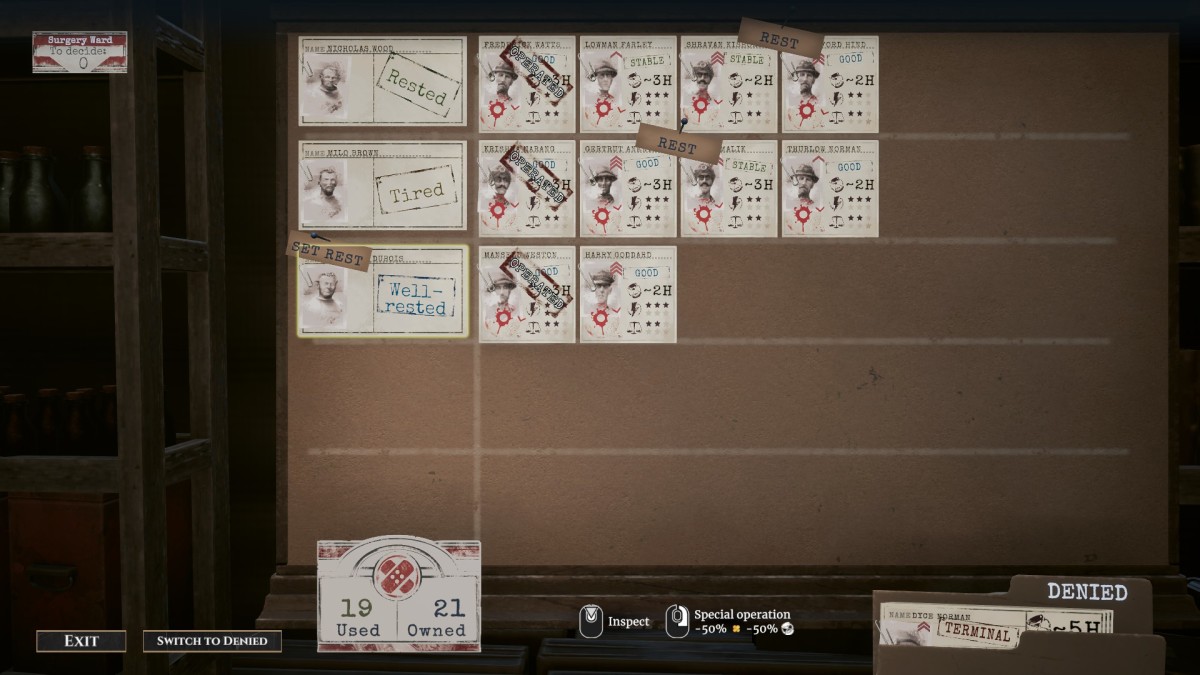
A lot of micromanagement is involved in keeping things running, though improvements like the shift system can help out a bit, which allows you to automate some aspects.
What you can’t automate is the tough decision over who is given a chance at life and who is going to die. When patients are delivered, you get to look at their file, which contains a short biography and a diagnosis – including vital information about their current state, how difficult an operation would be, how much medicine it would use, and how high the chance of failure is. Trying to save everyone is a sure way to doom your hospital, even though it’s the right thing to do. It’ll drain you of resources and energy, which could be used on men with higher odds of survival. Random events can complicate or simplify operations as well, asking you to make decisions on the fly that affect the outcome of the procedure – and the future of your patients, when we’re talking stuff like ordering amputations.
When an operation is successful, you get the choice of sending the man into the trenches to the north of your hospital (which are steadily under attack and must hold if you don’t want to lose the game), back to HQ (which grants you an important resource you can use to improve your hospital and order goods), or release them from service, which increases your morale. Again, you’d ideally want to let all of these people go home, but that’s sadly not possible. It’s another one of those demoralizing decisions you’ll have to make en masse.
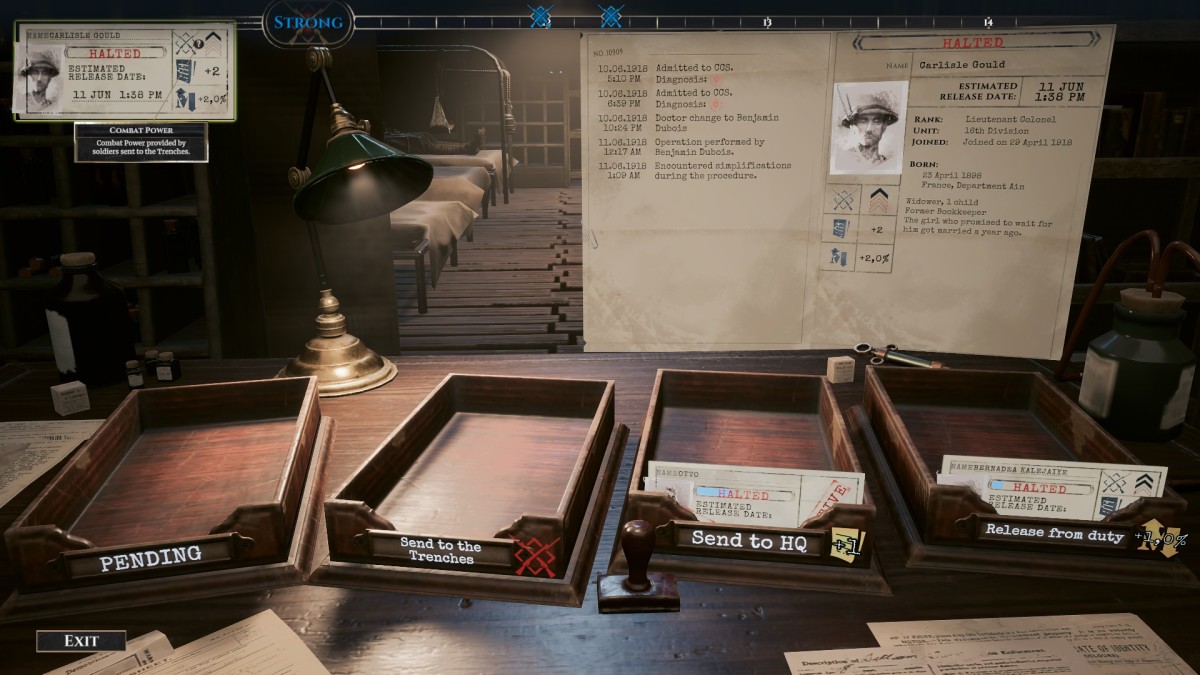
This gameplay loop is engaging at times, but quickly gets repetitive. It also feels like there is one optimal way of doing things in every run, no matter how randomized things are, and doing anything else just won’t work, which isn’t a fantastic thing in a strategy game. There are also no difficulty settings whatsoever, so you’re really at the mercy of the RNG gods sending events and patients you can actually handle. You mostly play with your mouse, but you can’t rebind any controls in the game, which can turn out badly if, as was the case for me, you’ve got a faulty middle mouse button that can’t reliably open patient files.
Though the developers did a nice job of portraying the diversity of the British troops that fought in the trenches of the western front through the artwork and names – you will find men from India, Southeast Asia, and Africa among your patients, as would have been the case in real life due to forces from all over the globe being thrown into the French meat grinder – a bit more variety would have been nice. One man very quickly looks like the other.
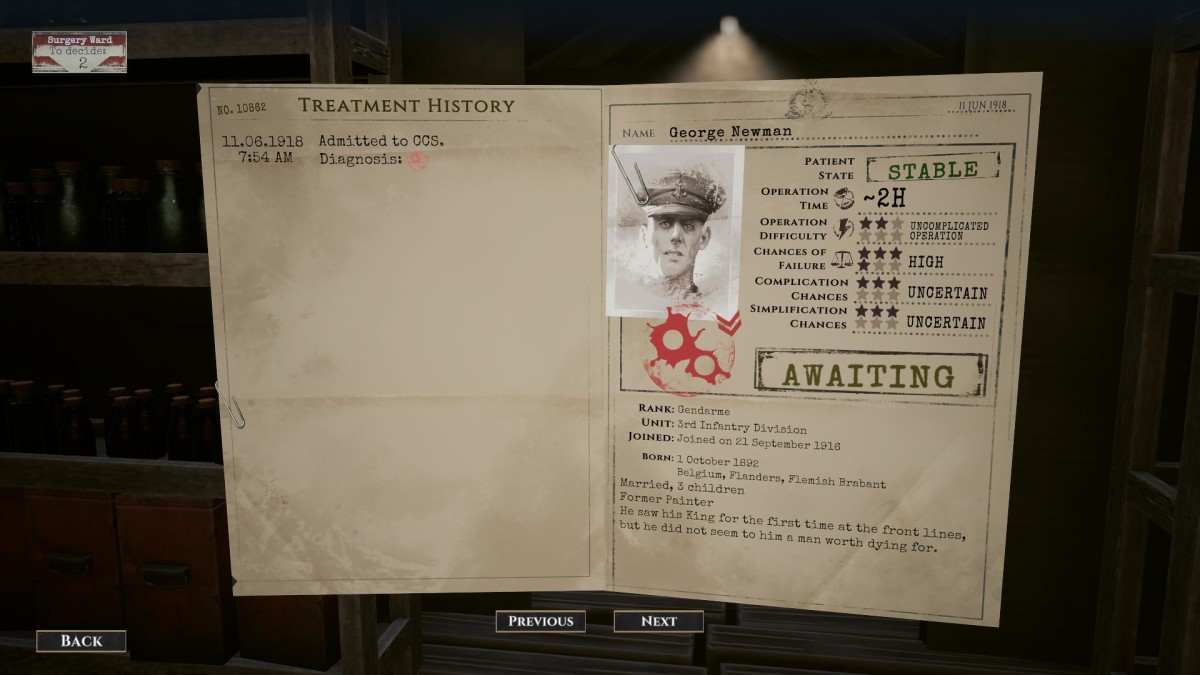
Unfortunately, the same is true for what is supposed to be one of the game’s core features, namely that every patient is a unique human being thanks to the backstories found in their files. After a while, you’ll notice all the different modules that have been randomly thrown together to make up the life stories of the people coming to you for help and you won’t notice them anymore – I think the pool of options probably just isn’t deep enough to really create a feeling of uniqueness for everyone.
While this is clearly a weakness for the game, in a way I appreciate it as a strength of the game as art, because isn’t it perfectly fitting that all of these portraits and backstories just get blurred together into one anonymous, faceless mass of manpower exploited for resources in this World War 1 game?
You may read everyone’s story at the start of the game, deciding to send the man home or back into war based on your feelings, but that quickly vanishes as you get overwhelmed by casualties, German attacks threaten to overrun your hospital, and your resources dry up. Sure, it feels bad to send this father of three children back into the trenches, but when my immediate survival is fully dependent on my defense’s combat power, happy feelings and a morale boost can wait.
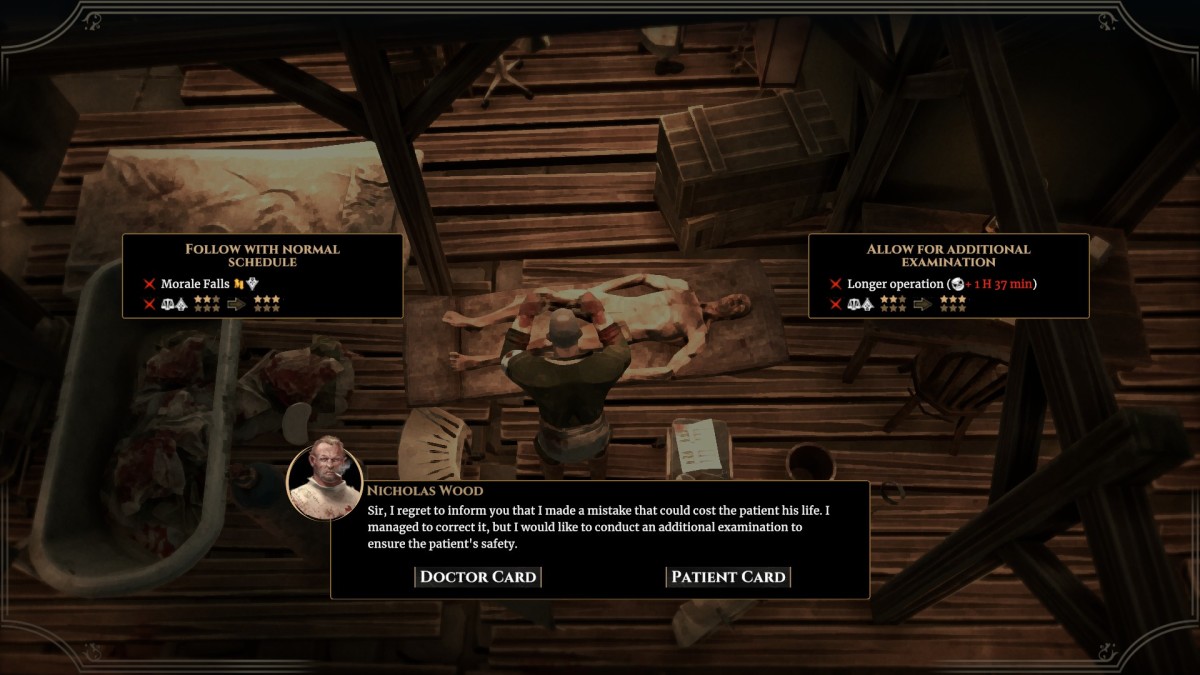
And this is kind of the issue with this whole game: On the one hand it asks you to be humane and become this ray of hope in what is at this point a living hell for everyone involved, but on the other hand you’re destined to become just another gear in the war machine because it’s “game over” otherwise – so, again, this is incredibly topical for this setting and I love that it invokes this sense of despair and inevitability that makes you want to just give up. But if you can’t change fate, if you can’t be what the game asks you to be, then it kind of fails to deliver.
I need to upgrade my hospital with better infrastructure and more personnel, but I have to hope for more casualties to be delivered in order to gather enough resources to do that. It makes you uncomfortable and feels like it contradicts itself on a fundamental level.
War Hospital falls a bit short for me as a video game – it has good ideas and scratches that management itch at least a little bit, though it’s quite repetitive and feels too punishing at times as opposed to simply challenging. It somewhat grinds down your will to play, which isn’t the best quality in a game. What it excels in – ironically, exactly because it grinds down your will to go on – is making you experience the sheer overwhelming despair and helplessness the brave people serving in these field hospitals must have felt as they fought to save as many lives as possible only to lose a countless number of them along with their own sense of humanity. War Hospital is a valuable history lesson and I’m glad I experienced it.
Score: 7/10
- Presentation: 7/10
- Narrative: 8/10
- Gameplay: 6/10
Tested on: PC.
